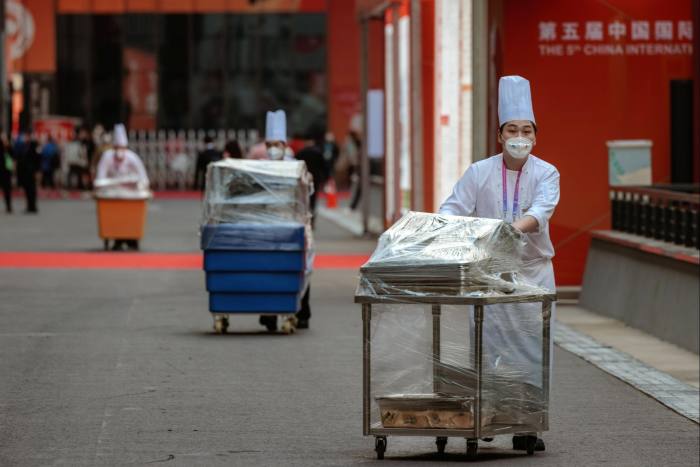[ad_1]
China has wrapped up a flagship import trade fair that sought to boost foreign access to its market, even as the government’s strict anti-coronavirus measures continue to constrain international trade with the country.
The China International Import Expo in Shanghai, one of the world’s largest trade events and a personal project of President Xi Jinping since it launched in 2018, hosted more than half of the biggest multinational companies, according to organisers.
The event, which was held partly virtually last year, comes at a pivotal moment. China’s economy faces intensifying pressure from the government’s zero-Covid policies, weakening trade data and mounting scrutiny of its reopening prospects.
While foreigners were largely absent from the vast 59-acre conference centre close to Shanghai’s Hongqiao airport, almost 500,000 people visited gleaming stalls where companies exhibited their latest products and technologies.
Chinese authorities continue to require a week of hotel quarantine for overseas arrivals, and unlike with previous events such as the Beijing Winter Olympics, a “closed loop” system was not set up to facilitate foreign attendance at the trade fair. The expo also applied its own Covid-19 protocols, including an entry requirement of a negative PCR test within the past 24 hours.
At a booth for Danish group Arla Foods Ingredients, Shanghai-based Asia head Alexander Leufgen said some customers from within China and abroad had struggled to get into the event because of the pandemic measures. The company was hosting a separate event for them downtown, he added.
“It’s a strict regime,” said Andreas Thorud, China director at the Norwegian Seafood Council. He added that Norwegian seafood exports to China were nonetheless up 4 per cent year on year by volume and 46 per cent in terms of value, marking a record.
“When it comes to Norwegian seafood in the Chinese market, the numbers can speak for themselves,” he said.

Such growth highlights the immense appeal of China’s market to foreign exporters despite the restrictions and trade disruptions caused by the pandemic. In 2020, China briefly halted European salmon imports after an outbreak was linked to Beijing’s Xinfadi wholesale market. Covid cases close to ports have sporadically obstructed trade.
Leufgen said his company had recorded double-digit revenue growth in China this year and the country remained an attractive market. “One side effect of Covid-19 has been that health awareness for people [in China] has increased,” he said.
Official trade data this week showed Chinese imports, which boomed early in the pandemic, dropped for the first time last month since 2020, while exports also contracted, despite forecasts of a 4.5 per cent increase. The economy grew 3.9 per cent in the third quarter, well below a government target of 5.5 per cent for the year.
Several foreign business representatives were only able to participate in the fair remotely, through a video conference attended almost entirely by domestic media. Dave Nicholas, a director at New Zealand dairy company Hoeslandt, said China was “the great opportunity for all New Zealand companies operating in the dairy industry”, adding he looked forward to travelling to China again after last visiting in 2019.
Domenico Monge, head of Italy’s biggest pet food brand Monge, echoed that China was a “wonderful opportunity” but pointed to challenges in the market, including domestic competition.
At an opening address on Friday via video link, Xi said China remained committed to the “fundamental national policy of opening up to the world”, adding that it would “work with all countries and all parties to share the opportunities in its vast market”.
But he provided no insight about any further relaxation of Covid controls. Speculation about a possible reopening has driven market gyrations in recent weeks.
At the Norwegian Seafood Council stall, Thorud said it was significant that the trade event went ahead in spite of the restrictions. “Right now, we see CIIE goes as planned,” he said. “China is not open yet, but when that happens, you need to be ready.”
Additional reporting by Wang Xueqiao in Shanghai
[ad_2]
Source link

